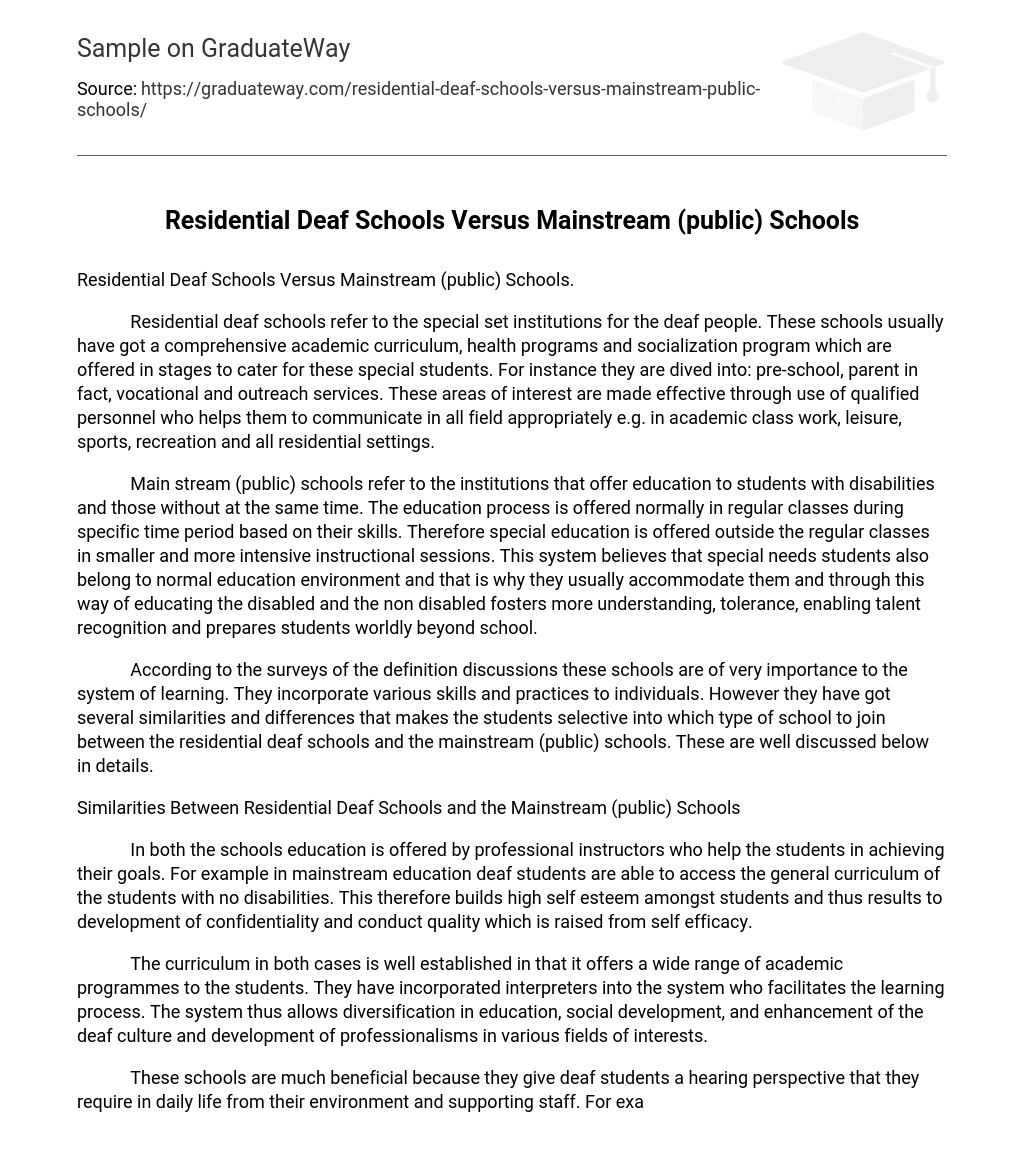Residential Deaf Schools Versus Mainstream (public) Schools.
Residential deaf schools refer to the special set institutions for the deaf people. These schools usually have got a comprehensive academic curriculum, health programs and socialization program which are offered in stages to cater for these special students. For instance they are dived into: pre-school, parent in fact, vocational and outreach services. These areas of interest are made effective through use of qualified personnel who helps them to communicate in all field appropriately e.g. in academic class work, leisure, sports, recreation and all residential settings.
Main stream (public) schools refer to the institutions that offer education to students with disabilities and those without at the same time. The education process is offered normally in regular classes during specific time period based on their skills. Therefore special education is offered outside the regular classes in smaller and more intensive instructional sessions. This system believes that special needs students also belong to normal education environment and that is why they usually accommodate them and through this way of educating the disabled and the non disabled fosters more understanding, tolerance, enabling talent recognition and prepares students worldly beyond school.
According to the surveys of the definition discussions these schools are of very importance to the system of learning. They incorporate various skills and practices to individuals. However they have got several similarities and differences that makes the students selective into which type of school to join between the residential deaf schools and the mainstream (public) schools. These are well discussed below in details.
Similarities Between Residential Deaf Schools and the Mainstream (public) Schools
In both the schools education is offered by professional instructors who help the students in achieving their goals. For example in mainstream education deaf students are able to access the general curriculum of the students with no disabilities. This therefore builds high self esteem amongst students and thus results to development of confidentiality and conduct quality which is raised from self efficacy.
The curriculum in both cases is well established in that it offers a wide range of academic programmes to the students. They have incorporated interpreters into the system who facilitates the learning process. The system thus allows diversification in education, social development, and enhancement of the deaf culture and development of professionalisms in various fields of interests.
These schools are much beneficial because they give deaf students a hearing perspective that they require in daily life from their environment and supporting staff. For example students in mainstream schools are acculturated into the hearing world as they usually come into contact with different people through communication apart from their interpreters. In addition for joining these schools the students are exposed into a hearing environment thus they are greatly stimulated in speech development and lip-reading. This helps the student to grow up understanding the use of knowledge and beliefs of this world which helps them to interact with others who can hear within their setting.
Differences Between Residential Deaf Schools and the Mainstream (public) Schools
Among the residential schools, there is cultural preservation through faculty and curriculum. Most of their faculties are deaf based thus they serve as a positive role model for deaf students. But for the case of mainstream their education psychology asserts that culture does not impact on the learning and teaching. This is due to their tendency of valueing the characteristics of mainstream, high status groups and devalues of other groups. They thus assume that powerful, Caucasian, hearing culture’s values are asserted on all students, regardless their natural status.
The residential schools usually limit the deaf students to interacting with only the deaf students. This means that here the learning environment is deaf cultured community that exists. But for a mainstream school students are exposed to different students both deaf and those that are not. This helps in diversifying education and strengthening social skills as there is sharing amongst them broadly through socialization. This integration also helps in the ability realization and in so, these students are not isolated and segregated.
In conclusion, both mainstream schools and residential schools usually enhance and promote positive identities to students differently. For example the residential school produces deaf identity through inclusion of the deaf history and culture whereas in mainstream school systems they produce a bicultural identity which supplements positve deaf role models of students.
Therefore since the past fifty years much contention has gone on this type of field. Most of the people who hear in the world would like the deaf to conform their own way of living as they have abilities and capabilities in them thus their disability is not incapability. Finally the Deaf themselves should strongly stand up and struggle to preserve their culture, identity, and language development. Therefore these schools should be promoted since they provide a quality education and positive deaf identity.
Reference
Lane, H., Hoffmeister, R., & Bahan, B. (1996). A journey into the Deaf world. Published by Dawn Sign Press: San Diego.
http://en.wikipedia.org/wiki/Mainstreaming in education





